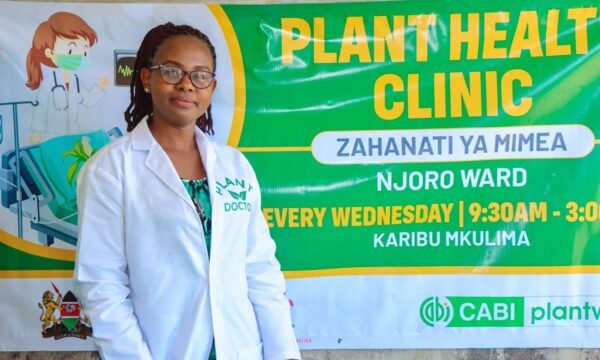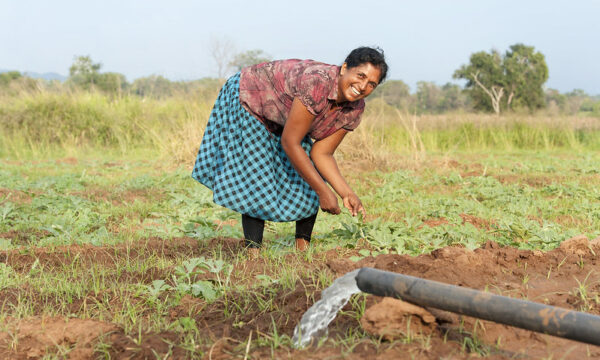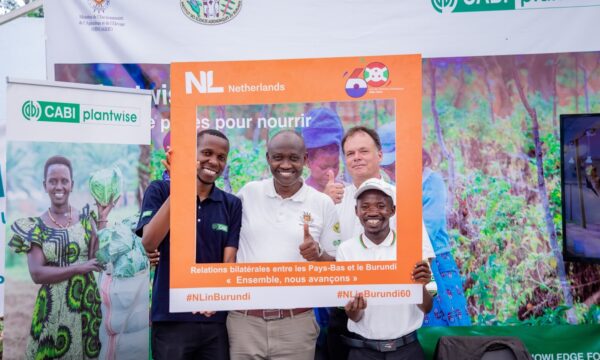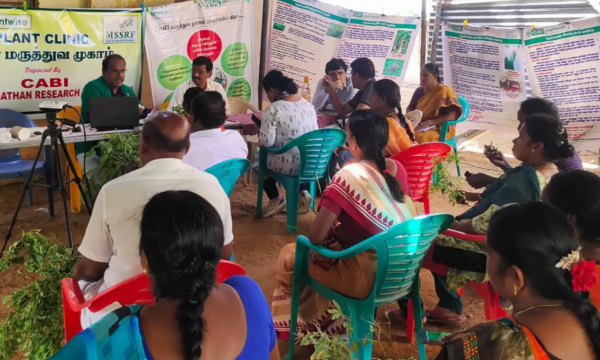[youtube http://www.youtube.com/watch?v=nC_iGco5z-E&w=560&h=315]
Over 60 stakeholders from Sri Lanka’s agricultural sector came together in the hilltops over Kandy in Sri Lanka recently to exchange experiences and discover strategies for implementing the Plantwise model on the ground. Video also available on Vimeo here.
Coming from extension, research, private enterprise, academia and policy-making, attendees at this national forum represented the top tiers of the plant health system, and were led by guest of honour Dr. D. B T Wijeratne , the Additional Secretary (Agriculture Technology) of the Ministry of Agriculture. The ‘Review and Way Forward Workshop’ was aimed at all those who are directly responsible for agricultural development, encouraging them to create concrete ideas for to ensure sustainability for plant clinics, or ‘crop clinics’ as they are known in the country.
This forum kicked off with an address by Research Officer Mr. W.M. D. H Kulatunga announcing that “It is time to learn, unlearn and relearn how to contribute to make this works sustainable, bring greater food security and income to our farmers.” Guests lit the traditional oil lamp to mark the start of collaboration.
 In Sri Lanka, a post-colonial small island nation emerging from civil unrest, challenges to agricultural development continue to evolve alongside changes in global markets, climate and technology. To respond, it is critical to build a highly-trained, highly-adaptable plant health system which supports farmers in the face of new challenges. One concern expressed by Additional Secretary Wijeratne was the urgent need to provide advice on safe pesticide use in order to combat the threat of acute pesticide poisoning for farmers, their families and their wider communities. In several districts, this is the number one cause of death reported at public hospitals. Working with Plantwise, Dr Wijeratne expressed hope that sound advice could reach farmers at the right time.
In Sri Lanka, a post-colonial small island nation emerging from civil unrest, challenges to agricultural development continue to evolve alongside changes in global markets, climate and technology. To respond, it is critical to build a highly-trained, highly-adaptable plant health system which supports farmers in the face of new challenges. One concern expressed by Additional Secretary Wijeratne was the urgent need to provide advice on safe pesticide use in order to combat the threat of acute pesticide poisoning for farmers, their families and their wider communities. In several districts, this is the number one cause of death reported at public hospitals. Working with Plantwise, Dr Wijeratne expressed hope that sound advice could reach farmers at the right time.
“Because farmers don’t know how to use pesticides, they misuse, overuse as well as abuse. We have to stop that,” says Dr Wijeratne. “In Sri Lanka the knowledge is there, but most of the knowledge is with officials and input suppliers. We need to reap the benefits of all these good things- the message has to go to the farmers.”
This urgent challenge demonstrates that it is the right time to review progress and plan ahead for comprehensive plant clinic coverage in the country.
“Plantwise fills a need,” agreed Mr M.U.P. Jayasundara, Agricultural Officer with the Plant Protection Service, the national implementing partner. “We can use the plant doctor prescription sheet as a requirement to show the agro-dealers to receive inputs, providing a sort of checks and balances.”
Mr P.T. Bandera, National Coordinator in Sri Lanka, Deputy Director, Plant Protection and head of the Permanent Crop Clinic Programme commented that in order to put these plans into action the national system “needs to reorganize to include Plantwise roles into the Terms of Reference from the start.”
 Since April 2013, when the first partnership agreement was signed between CABI and the Ministry of Agriculture to launch Plantwise in Sri Lanka, both CABI coordinators and national implementing partners have been working towards a common goal: utilizing Plantwise resources to provide improved advice to farmers.
Since April 2013, when the first partnership agreement was signed between CABI and the Ministry of Agriculture to launch Plantwise in Sri Lanka, both CABI coordinators and national implementing partners have been working towards a common goal: utilizing Plantwise resources to provide improved advice to farmers.
CABI representatives in attendance, including Ashraf Poswal, Global Director of Plant Health Systems Development, Abdul Rehman, CABI’s Country Coordinator for Sri Lanka, and Daud Ahmad, Expert Field Coordinator for the Going Green Project, toured stakeholders through the latest resources offered by Plantwise. They heard about pesticide recommendation training through Green and Yellow Lists, as well as the POMS data management system to support national vigilance against pests, and how these could be embedded into the plant health system only with national support.
With over 254 clinics operated by 299 plant doctors, Sri Lanka has one of the most resourced programmes for Plantwise in the world, and their input on how plant clinics function is very valuable. This workshop took representatives out into the field, to visit plant clinics, plant doctors and farmers in action around central Kandy, to directly inform their feedback on pros and cons of the current implementation approach.
The question whether farmers appreciate and trust plant clinic services was answered by the queue in the old temples and community centres where the clinics were held that day. Near central Kandy, most farming is at the family-level, and the clinics see men and women attending clinic sessions to seek advice about pests ravaging their small-scale vegetable gardens.
 One plant doctor visited at Menkikdiwala clinic outside Kandy agreed that “this training has been very helpful,” to her. “It has helped me in organizing, decision-making and been useful in covering a large extension area- 37 villages with over 75 farmers each,” says Agricultural Instructor Maheshika Wirkranakaluthe. “And now the farmers’ tendencies are going towards non-chemical solutions as well, so this is very positive.”
One plant doctor visited at Menkikdiwala clinic outside Kandy agreed that “this training has been very helpful,” to her. “It has helped me in organizing, decision-making and been useful in covering a large extension area- 37 villages with over 75 farmers each,” says Agricultural Instructor Maheshika Wirkranakaluthe. “And now the farmers’ tendencies are going towards non-chemical solutions as well, so this is very positive.”
Farmers agree. “Whenever I have a problem, I take it to the clinic. If I didn’t have the clinic here I would have to go to Peradeniya, which is too far plant,” says farmer H.G. Jayawardana from Hettiwatha.
Back at the workshop, break-out groups collaborated on lists of valuable suggestions, small and large, to help crop clinic implementation. Suggestions included holding a National Crop Clinic Day event to further popularize the program with farmers and agricultural sector stakeholders, and holding clinics on Saturdays when farmers are available. Others presented ideas like providing more photo sheets to help farmers who do not bring their own samples. All agreed that strengthened links to diagnostics services in the country would further build confidence for both researchers and extension officers alike.
 “In two districts I have 127 plant doctors,” says plant doctor trainer Mr S.M. Hussain. “When the farmers come for plant problems they come with many other problems- seed supply, marketing questions. The agricultural sector has to step up the calibre to solve these problems,” suggested Hussain to the group.
“In two districts I have 127 plant doctors,” says plant doctor trainer Mr S.M. Hussain. “When the farmers come for plant problems they come with many other problems- seed supply, marketing questions. The agricultural sector has to step up the calibre to solve these problems,” suggested Hussain to the group.
For other countries implementing Plantwise, commitment to common goals can inspire stakeholders to negotiate changes in an existing framework, as demonstrated by this workshop in Kandy. Also vital was the sense of collaboration for finding the ‘way forward’ with Plantwise. Hopefully, as this is set to become an annual forum, stakeholders will come back at the end of this year to find many recommendations already embedded into a robust and impactful programme.
Related News & Blogs
“The health of plants, animals, people and the environment is interlinked in so many ways”
Without healthy crops, food systems crumble, livelihoods suffer, and communities become more vulnerable to food insecurity. PlantwisePlus supports countries in strengthening plant health systems and improving food quality, quantity, and security. Plant…
12 May 2025




